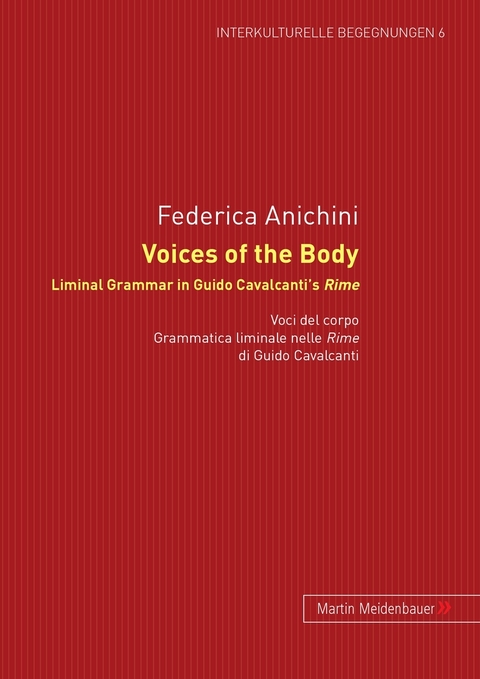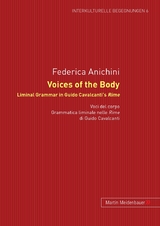Voices of the Body. Liminal Grammar in Guido Cavalcanti's Rime
Voci del corpo. Grammatica liminale nelle Rime di Guido Cavalcanti
Seiten
2009
Peter Lang Gmbh, Internationaler Verlag Der Wissenschaften
978-3-89975-131-4 (ISBN)
Peter Lang Gmbh, Internationaler Verlag Der Wissenschaften
978-3-89975-131-4 (ISBN)
Die Reihe vorliegende Reihe wendet sich an FachwissenschaftlerInnen der literatur- und kulturwissenschaftlichen Fächer, an alle historisch-kunstgeschichtlich- humanistischen Disziplinen sowie an die Fremdsprachenphilologien. Sie versteht sich als Beitrag zur Erforschung und zum Verständnis der wechselseitigen kulturellen Beziehungen und der von ihnen ausgehenden Impulse. Es werden Beiträge in italienischer, französischer, englischer, spanischer und deutscher Sprache veröffentlicht.
Guido Cavalcanti, the first thirteenth-century author to gain the reputation of an auctoritas while still alive, has been handed down by literary tradition mainly for his Canzone Donna me prega, a dense philosophical treatise about love.
This book looks at the Rime from the perspective of the minor poems, in which Cavalcanti demonstrates his theoretical conclusion by staging the venture of a lover inescapably doomed. Mired in his sensations, the lover exemplifies an existence that falls short of the faculty of imagination, therefore of the vision of God. The terrestrial perfection available to humans also affects language. The Voices of the Body are the nonverbal signs that Cavalcanti employs to articulate a grammar that is delimited by the lovers sensorial capacities. Federica Anichini focuses on two corporeal modes of speaking, spirits and tears. Her investigation of Cavalcantis lines is grounded in the pages of the most popular medical handbook of the thirteenth and fourteenth centuries, Avicennas Liber Canonis, as well as in the linguistic theories of the Modistae.
This study outlines Guido Cavalcanti as the forger of a special grammar that stands as a revolutionary invention in the field of poetic language.
Guido Cavalcanti, the first thirteenth-century author to gain the reputation of an auctoritas while still alive, has been handed down by literary tradition mainly for his Canzone Donna me prega, a dense philosophical treatise about love.
This book looks at the Rime from the perspective of the minor poems, in which Cavalcanti demonstrates his theoretical conclusion by staging the venture of a lover inescapably doomed. Mired in his sensations, the lover exemplifies an existence that falls short of the faculty of imagination, therefore of the vision of God. The terrestrial perfection available to humans also affects language. The Voices of the Body are the nonverbal signs that Cavalcanti employs to articulate a grammar that is delimited by the lovers sensorial capacities. Federica Anichini focuses on two corporeal modes of speaking, spirits and tears. Her investigation of Cavalcantis lines is grounded in the pages of the most popular medical handbook of the thirteenth and fourteenth centuries, Avicennas Liber Canonis, as well as in the linguistic theories of the Modistae.
This study outlines Guido Cavalcanti as the forger of a special grammar that stands as a revolutionary invention in the field of poetic language.
Federica Anichini is Assistant Professor at The College of New Jersey.
| Erscheint lt. Verlag | 1.10.2009 |
|---|---|
| Reihe/Serie | Interkulturelle Begegnungen. Studien zum Literatur- und Kulturtransfer ; 6 |
| Verlagsort | Frankfurt a.M. |
| Sprache | englisch |
| Maße | 147 x 210 mm |
| Gewicht | 408 g |
| Themenwelt | Geisteswissenschaften ► Sprach- / Literaturwissenschaft ► Literaturwissenschaft |
| Geisteswissenschaften ► Sprach- / Literaturwissenschaft ► Romanistik | |
| Schlagworte | Anichini • Boccaccio • Body • Cavalcanti • Cavalcanti's • corpo • Dante • Frederica • grammar • grammatica • Guido • Guido Calvacanti • Hardcover, Softcover / Romanische Sprachwissenschaft, Literaturwissenschaft • Human Love in Darkness • Liber Canonis • Liminal • liminale • nelle • Rime • voci • Voices |
| ISBN-10 | 3-89975-131-0 / 3899751310 |
| ISBN-13 | 978-3-89975-131-4 / 9783899751314 |
| Zustand | Neuware |
| Haben Sie eine Frage zum Produkt? |
Mehr entdecken
aus dem Bereich
aus dem Bereich
Buch | Softcover (2020)
Beuth (Verlag)
19,90 €




